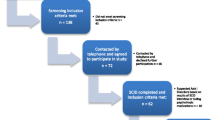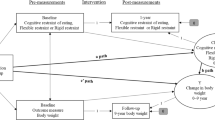Abstract
Cognitive attitudes and beliefs towards food and body shape are repeatedly reported as a maintaining factor of obesity. In order to assess evolution of those cognitions following a dietary treatment 18 overweight and obese females undergoing a dietary treatment were assessed using the Mizes Anorectic Cognitions questionnaire (revised form) before and after a 3-month moderate calorie restricted diet. Binge eating status was also assessed in pre-treatment. The main finding of the present study is persistence of anorectic cognitions following a moderate calorie restricted diet treatment and furthermore a more pejorative evolution of those cognitions in patients with binge symptomatology.
Similar content being viewed by others
References
Mizes J.S., Klesges R.C.: Validity, reliability, and factor structure of the Anorectic Cognitions Questionnaire. Addict. Behav., 14, 589–594, 1989.
Westenhoefer J.: Dietary restraint and disinhibition: is restraint a homogeneous construct? Appetite, 16, 45–55, 1991.
Ruderman A.J.: Dietary restraint: a theoretical and empirical review. Psychol. Bull., 99, 247–262, 1986.
Fedoroff I., Polivy J., Herman C.P.: The specificity of restrained versus unrestrained eaters’ responses to food cues: general desire to eat, or craving for the cued food? Appetite, 41, 7–13, 2003.
Polivy J., Herman C.P.: Dieting and binging. A causal analysis. Am. Psychol., 40, 193–201, 1985.
Hsu L.K., Mulliken B., McDonagh B., Krupa D.S., Rand W., Fairburn C.G., Rolls B., McCrory M.A., Saltzman E., Shikora S., Dwyer J., Roberts S.: Binge eating disorder in extreme obesity. Int. J. Obes. Relat. Metab. Disord., 26, 1398–1403, 2002.
Cargill B.R., Clark M.M., Pera V., Niaura R.S., Abrams D.B.: Binge eating, body image, depression, and self-efficacy in an obese clinical population. Obes. Res., 7, 379–386, 1999.
Sherwood N.E., Jeffery R.W., Wing R.R.: Binge status as a predictor of weight loss treatment outcome. Int. J. Obes. Relat. Metab. Disord., 23, 485–493, 1999.
Agras W.S., Telch C. F., Arnow B., Eldredge K., Marnell M.: One-year follow-up of cognitive-behavioral therapy for obese individuals with binge eating disorder. J. Consult. Clin. Psychol., 65, 343–347, 1997.
Mizes J.S., Christiano B., Madison J., Post G., Seime R., Varnado P.: Development of the mizes anorectic cognitions questionnaire-revised: psychometric properties and factor structure in a large sample of eating disorder patients. Int. J. Eat. Disord., 28, 415–421, 2000.
Garner D.M., Olmsted M.P.: Scoring the eating disorder inventory. Am. J. Psychiatry, 143, 680–681, 1986.
Laessle R.G., Tuschl R.J., Kotthaus B.C., Pirke K.M.: A comparison of the validity of three scales for the assessment of dietary restraint. J. Abnorm. Psychol., 98, 504–507, 1989.
Mizes J.S.: Validity of the Mizes Anorectic Cognitions scale: a comparison between anorectics, bulimics, and psychiatric controls. Addict. Behav., 17, 283–289, 1992.
Osman A., Chiros C. E., Gutierrez P.M., Kopper B.A., Barrios F.X.: Factor structure and psychometric properties of the brief Mizes Anorectic Cognitions questionnaire. J. Clin. Psychol., 57, 785–799, 2001.
Mizes J.S., Sloan D.M.: An empirical analysis of eating disorder, not otherwise specified: preliminary support for a distinct subgroup. Int. J. Eat. Disord., 23, 233–242, 1998.
Author information
Authors and Affiliations
Corresponding author
Rights and permissions
About this article
Cite this article
Khazaal, Y., Revaz, R., Rothen, S. et al. Persistence of anorectic cognitions following a moderate calorie restricted diet. Eat Weight Disord 11, e27–e29 (2006). https://doi.org/10.1007/BF03327749
Received:
Accepted:
Published:
Issue Date:
DOI: https://doi.org/10.1007/BF03327749




